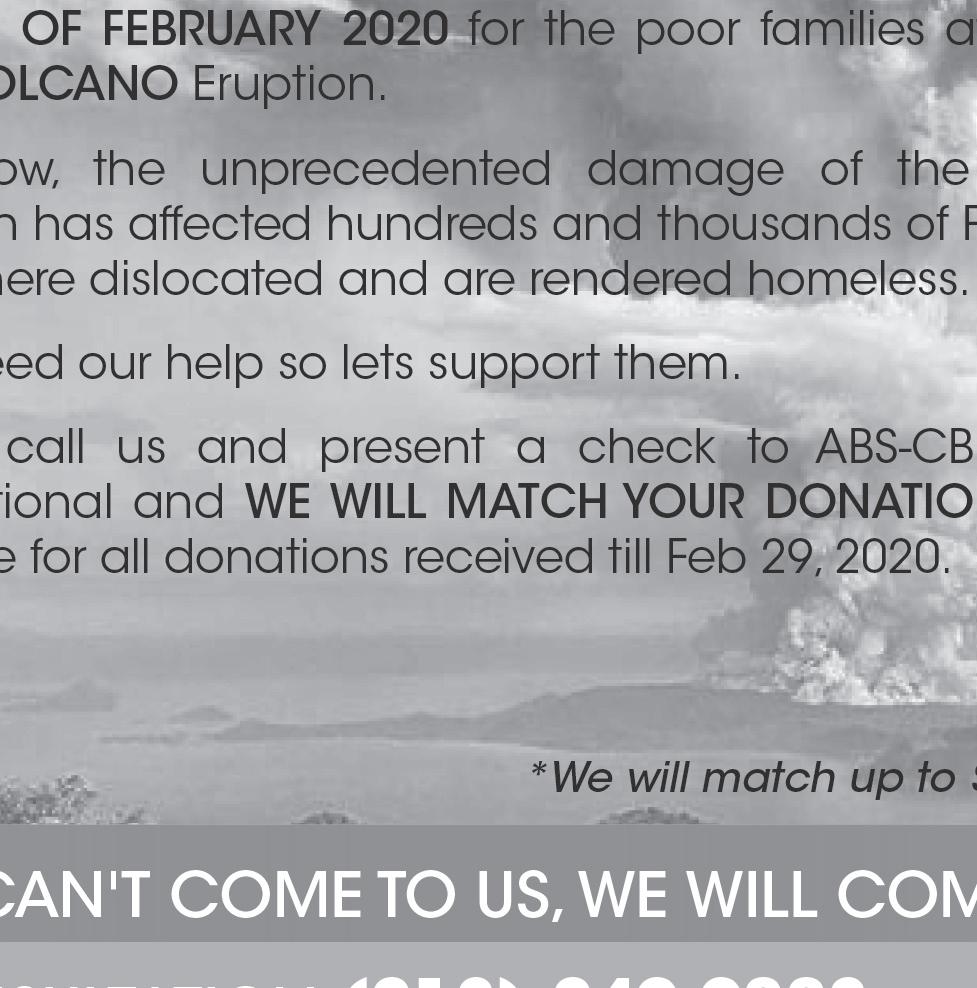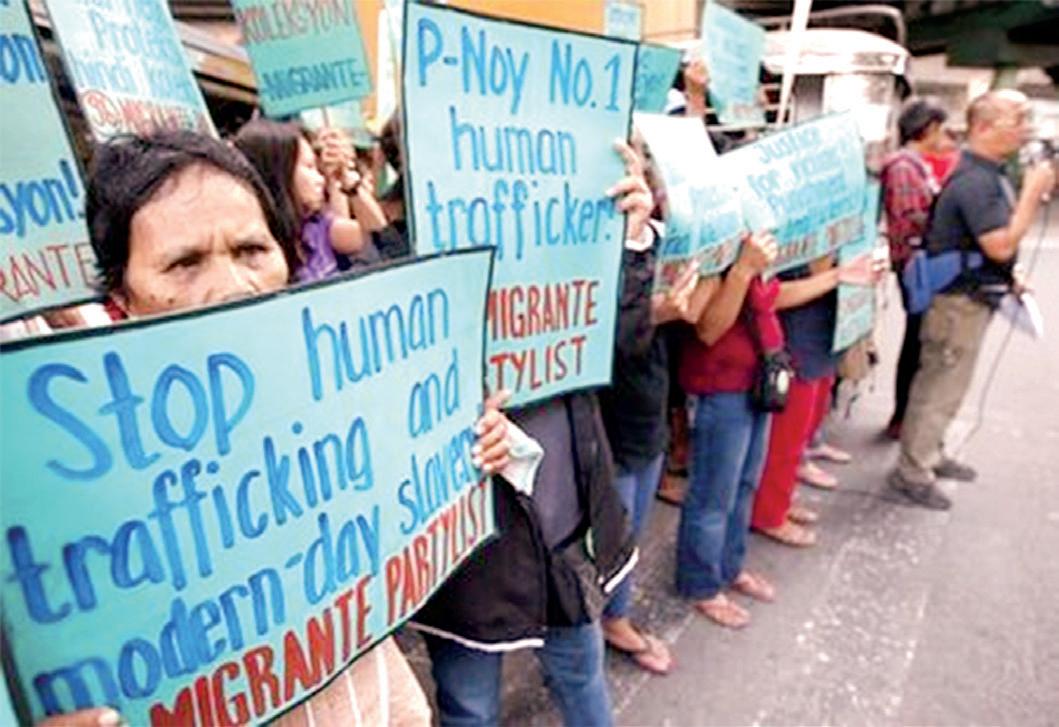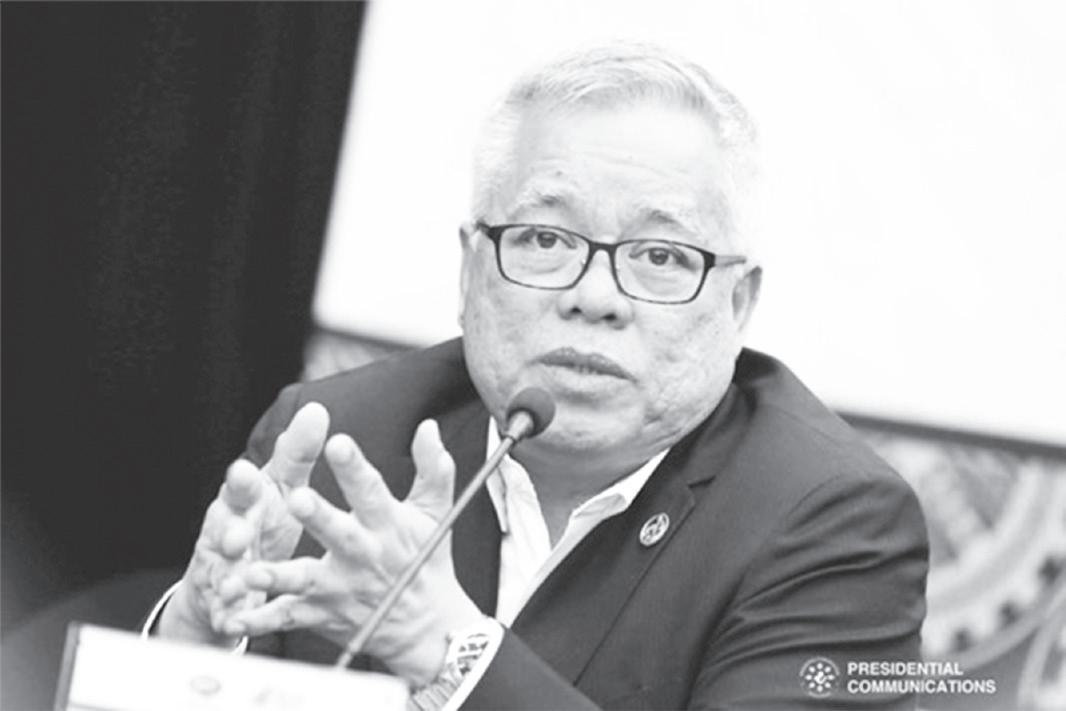
21 minute read
SC
'All systems go' for integrity, anti-corruption offi ces in judiciary — SC
MANILA (Mabuhay) — The Supreme Court (SC) on Friday said it is "all systems go" for two offices that will act on complaints against and investigate erring justices, judges, and court officials and employees.
The SC Public Information (SC PIO) said the court has approved the proposed amendments for the implementation of the Judicial Integrity Board (JIB) and the Corruption Prevention and Investigation Office (CPIO).
These offices were created in 2018 but were "put on the back burner" to give way to a review of the JIB's functions and prevent duplicity with those of the Office of the Court Administration (OCA) and other offices, the SC PIO said.
The JIB will act on complaints against erring justices, judges, officers and employees of the judiciary. The CPIO, on the other hand, will investigate erring justices of the tertiary courts, judges and personnel of the lower courts, including the Shari’a Courts; and the officials and employees of the Office of the Jurisconsult, Court Administrator, Deputy Court Administrator, Assistant Court Administrators and their personnel.
The resolution approving the amendments will be published in a newspaper of general circulation on August 1, the SC PIO said.
Chief Justice Diosdado Peralta had committed to "weed out misfits from the judiciary" as part of his 10-point program as top magistrate.
Early into his appointment last year, Peralta said he would implement the JIB, whose functions would be "harmonized" with that of the OCA. (MNS)
New record-high: Over 4,000 more COVID-19 cases recorded as gov't extends quarantine
MANILA (Mabuhay) — The Department of Health on Friday reported 4,063 additional COVID-19 cases in the Philippines, the highest number of cases reported in a single day since the start of the pandemic.
This brings the total number of COVID-19 cases to 93,354. It means the country has exceeded the University of the Philippines OCTA Research Group’s updated estimate of 90,000 for the end of July.
The announcement came several hours after the government announced the extension of the relatively relaxed general community quarantine (GCQ) in Metro Manila despite the continued rise in cases.
It was also a day after the DOH announced more than 38,000 additional recovered patients due to “data reconciliation,” which brought down drastically the country’s number of active cases.
“Of the 4,063 additional cases reported today, 3,813 (94 percent) occurred in July,” the DOH said.
The top regions with cases in July were:
NCR: 2,153 cases (56 percent)
Region 7: 558 cases (15 percent)
Region 4A: 492 cases (13 percent)
For Friday, the DOH reported 165 additional recoveries or a total of 65,178 recovered patients.
There are also 40 additional coronavirus-related deaths or a total of 2,023 fatalities.
Of the 40 deaths, majority or 27 happened in July, 2 in June, 2 in May, 7 in April, and 2 in March.
The deaths were from NCR (13), Region 7 (12), Region 3 (7), Region 4A (2), Region 6 (2), Region 11 (2), and one each from Region 4B and Region 9.
The data is based on the tests done by 74 out of 91 operational labs.
The DOH also removed 83 duplicate cases from the previous tally. It includes 42 recovered cases.
“Moreover, we have updated the health status of nine (9) cases previously reported as recovered but after final validation were deaths (8) and active (1) cases,” the DOH said.
Meanwhile, the Department of Foreign Affairs (DFA) reported an increase of 1.26 percent in the total number of Filipinos who have recovered from COVID-19 with 69 new recoveries in the Middle East, compared to yesterday’s figures.
However, confirmed COVID-19 cases also increased with 65 new cases in the Asia and the Pacific, Europe, and Middle East. Similar to yesterday’s report, the DFA confirms no new fatalities today. "As the DFA, along with its Foreign Service Posts, joins our Muslim brothers and sisters in observing Eid’l Adha, we offer prayers of healing, peace, hope and unity in these challenging times," it said in a statement. (MNS)






Gov't to ensure action vs. OFW traffi cking during pandemic
MANILA (Mabuhay) — The government will not let its guard down against human trafficking even during the coronavirus disease 2019 (Covid-19) pandemic, an official of the Inter-Agency Council Against Trafficking (IACAT) said on Thursday.
In a statement, IACAT officer-in-charge Senior Assistant State Prosecutor Jinky Delumo said the Philippine government will continue working to ensure coordinated action on cases particularly the trafficking of overseas Filipino workers (OFWs). "We will not let the Covid-19 virus slow us down," Delumo said.
The IACAT announced the launch of its digital case management system for trafficking cases.
Meanwhile, Justice Undersecretary Emmeline Aglipay-Villar said IACAT aims to send more rogue government officials involved in human trafficking behind bars.
In an online forum and press conference on the occasion of the World Day Against Trafficking, Villar said one of the recommendations under the Global Trafficking in Persons Report “is to get more convictions against complicit government officials”.
“We’ve been working on that to get those convictions and hopefully this year we will be able to achieve that,” she added.
She said that since 2005, there have been a total of 565 persons convicted in human trafficking cases but only five government officials were sentenced.
The Philippines has been Tier 1 in the Global Trafficking in Persons Report from 2016 up to the 2020.
“In fact, in Southeast Asia, we’re the only one to be able to attain Tier 1 ever,” she noted.
She said that during these five years “the government of the Philippines has fully met the minimum standards for the elimination of trafficking”.
“We’ve successfully managed to retain those efforts for five years. It’s not easy to attain this ranking,” Villar said. (MNS)

Minors with special needs, foreign parents can enter PH
MANILA (Mabuhay) — The Inter-Agency Task Force for the Management of Emerging Infectious Diseases (IATF-EID) has allowed Filipino children with special needs, as well as the foreign parents of minor Filipino nationals, who have Philippine visas, to visit the country amid the coronavirus disease 2019 (Covid-19) pandemic.
The IATF-EID’s latest decision was contained in its Resolution 60 approved on Thursday.
The new resolution introduces amendments to IATF-EID Resolution 14 approved on March 20, which states that only foreign spouses and children of Filipino nationals are exempted from the suspension of visa issuance.
Under IATF-EID Resolution 60, “foreign spouses, minor children, including children with special needs, regardless of age, of Filipino nationals, as well as foreign parents of minor Filipino nationals, including children with special needs, regardless of age” can enter the Philippines.
They, however, should secure Philippine visas before they can be allowed to go to the country.
Originally, only accredited foreign government and international organization officials and their dependents, as well as foreign spouses and children of Filipinos, can visit the Philippines amid the pandemic.
On July 17, the IATF-EID also approved a resolution allowing the entry of foreigners with long-term visas in the country beginning August 1.
Foreign travelers are subject to the maximum capacity of inbound passengers at the port and date of entry because returning overseas Filipinos will be given priority.
They must also secure a prebooked accredited quarantine facility and a pre-booked Covid-19 testing provider.
Meanwhile, the IATF-EID also approved recommendations on the time-based reckoning of Covid-19 recoveries.
“Time-based reckoning of recoveries of mild and asymptomatic patients who have completed 14 days of isolation from the date of onset of illness or specimen collection shall be immediately implemented,” the resolution read.
The IATF-EID’s new resolution directs the Department of the Interior and Local Government to reiterate and cascade recovery plans to the local government units (LGUs) by clarifying that the counting of the 14-day isolation for mild and asymptomatic cases should start from the date of the onset of illness or specimen collection.
It also orders the submission of “accurate, complete, and timely” reports to the Department of Health.
The reports, according to the resolution, should include updates on the health status and outcomes of patients upon discharge, recovery, or death by all hospitals, LGUs, and disease reporting units. (MNS)






























Gatchalian urges transparency in study of nuclear energy
MANILA (Mabuhay) — Senator Sherwin Gatchalian of nuclear power,” he said. Energy Program, measures to address on Thursday urged the inter-agency committee as- The committee was tasked infrastructure gaps, and recommend infrastructure gaps, and recommend signed to study the possible use of nuclear energy to evaluate and assess the the necessary steps in the utilization the necessary steps in the utilization to proceed with utmost transparency to the public, need for and viability of of existing facilities. of existing facilities. saying that nuclear power is a ‘risky’ business. introducing nuclear power The senator stressed that nuclear
On Wednesday, President Rodrigo Duterte into the country’s energy power is a “risky business." formed the Nuclear Energy Program Inter-Agen- mix, taking into consider- "The world is always in constant de"The world is always in constant decy Committee to study the possibility of tapping ation economic, security bate on the adoption of nuclear pownuclear energy in efforts to seek a steady power and environmental im- er because of its inherent risk to supply in the country. plications, and engage- public welfare,” Gatchalian said. "Transparency should be the guiding post from ment of the public and "Moreover, it is an energy day one on the conduct of the study for the possi- relevant stakeholders. source that is very complicatble adoption of nuclear power in our energy mix,” It was also direct- ed and demands high-level Gatchalian said. ed to formulate a knowledge to fully maximize
Gatchalian said that “only an open and free dis- roadmap and time- it's utilization without sacricussion” of nuclear power "will deepen the com- line in the prepara- ficing public safety,” he added. prehension of the public." "The conduct of this study should tion of the Nuclear SENATOR SHERWIN GATCHALIAN (MNS) proceed with utmost transparency to the public in every step of the way. The public should be well-informed Filipinos divided about going to work, on the inherent risk and the potential church even after COVID-19 lockdown — SWS


UP experts project 150k COVID-19 cases by end of August
MANILA (Mabuhay) — Experts from the University of the Philippines (UP) said Friday the number of COVID-19 cases in the country may reach 150,000 by the end of August.
Almost double the current national case total, the projection reflects the "exponential growth" experts have talked about, Professor Ranjit Rye of the UP OCTA research team said.
The current national case total is 89,374 as of Thursday. Of this number, there are 22,327 active cases after the Department of Health reported a record 38,075 recoveries in one day. Nearly 2,000 patients have died.
Rye said the team recommended to President Rodrigo Duterte on Thursday to either reinstate the modified enhanced community quarantine in Metro Manila or retain the general community quarantine, with enhanced localized lockdowns and enhanced testing, tracing, and isolation.
Metro Manila, Bulacan, Batangas, Cavite, Laguna, Rizal, Cebu City, Lapu-Lapu City, Mandaue City, Minglanilla and Consolacion towns in Cebu province, and Zamboanga City will be under GCQ from August 1 to 15.
The rest of the Philippines will be under modified GCQ.
While the virus' reproduction number, or the number of people an infected person could pass the virus to, in Metro Manila has decreased from 1.75 to between 1.3 and 1.4, Rye said this is still a high value. "Mataas pa rin po kasi siya... [dapat] below one," he said in the radio interview.
In an earlier report, the UP OCTA team said that to flatten the curve, the reproduction number should be less than one. A value higher than one indicates the pandemic is spreading.
Meanwhile, the virus' reproduction number in Cebu has fallen to less than one -- - 0.8 or 0.9, according to Professor Guido David, who is also part of the OCTA research team.
He said this means Cebu has flattened the curve but that this is not a reason to disregard health standards. (MNS) MANILA (Mabuhay) — Filipinos are divided about going to work and attending religious activities even after the community quarantine due to coronavirus disease 2019 (COVID-19) ends, Social Weather Stations survey results released Friday showed.
According to SWS national mobile phone survey conducted July 3 to 6, 55% of the employed Filipinos feel comfortable about going to work in case the community quarantine or lockdown ends next month while 40% feel uncomfortable.
Of the respondents, 20% feel very comfortable and 34% fairly comfortable going to work while 26% were not very comfortable and 13% were not at all comfortable.
The survey also showed that 45% of adults feel comfortable while 54% feel uncomfortable about attending religious services, such as going to church or mosque.
Those from Mindanao feel comfortable about going to work and church, 64% and 45%, respectively, while residents of Metro Manila were the least comfortable, 45% and 39%, respectively.
The proportion of those comfortable going to work was higher in men than women.
The SWS also said those comfortable about attending religious services were higher among Muslims, 71%; and members of Iglesia ni Cristo, 58%; compared to Christians other than Roman Catholics and Iglesia ni Cristos, 47%; other non-Christian religions, 42%; and Roman Catholics, 41%.
The survey asked 1,555 adult Filipinos nationwide using mobile phone and computer-assisted telephone interviewing and has sampling error margins of ±2% for national percentages, ±6% for Metro Manila, and ±5% for Balance Luzon, ±5% for the Visayas, and ±5% for Mindanao
SWS also said it employed its own staff for questionnaire design, sampling, fieldwork, data-processing, and analysis, and does not outsource any of its survey operations. (MNS)


Ecleo to be probed for massacre of wife's kin, says PNP
MANILA (Mabuhay) — The Philippine National Police will investigate former lawmaker and cult leader Ruben Ecleo Jr. for his alleged role in the killing of his wife’s loved ones, Police Major General Debold Sinas said on Thursday.
In a briefing, Sinas cited reports from regarding Ecleo's alleged involvement in the killings.
“We will be tracking also kasi accordingly hindi lang ‘yung asawa ‘yung pinatay niya. According to our friends in Cebu City, 'yung pamilya po ni Alona Bacolod, comprising sa father, sa mother, ‘yung sister na si Evelyn at saka si Ben was also massacred din in June 2, 2002,” Sinas said.
In April 2012, Ecleo was convicted for the January 2002 murder of his wife, Alona Bacolod-Ecleo, whose body was found decomposing in a ravine.
Sinas said that reports showed that Ecleo was involved in the killings but a was not filed.
“According to reports, may kinalaman siya pero that case was not filed unlike ‘yung sa asawa niya. But everybody knows doon sa Cebu na siya ang prime suspect,” Sinas said.
“[T]hat is investigated by Cebu before in 2002 and I think may mga investigation sila. As to the progress of the case, we will find out,” he added.
Ecleo, meanwhile, denied killing the family but said that he had admitted to the crime after being accused.
“Hindi ako ang gumawa pero kasi inakusahan ako at na prove na kaya aminin ko na,” Ecleo said in Bisaya.
His response was translated by Philippine National Police chief Police General Archie Gamboa.
Ecleo also said that he also did not issue an order to kill the family and later denied knowing the culprit.
Authorities arrested Ecleo at the vicinity of a golf course in San Fernando, Pampanga where he surrendered peacefully.
He is the leader of the Philippine Benevolent Missionaries Association, a group based in Dinagat Islands. (MNS)
Processing of telco infra permits down to 16-20 days — DILG


MANILA (Mabuhay) — The processing period of permits for power infrastructure of telecommunications companies (telcos) will now be shortened to a maximum of 20 days, Interior Secretary Eduardo Año said on Friday.
In a taped briefing with President Rodrigo Duterte aired over state-run PTV-4, Año said the joint memorandum circular (JMC) recently signed by several national government agencies would significantly remove ‘red tape’ in the processing of licenses and permits particularly in setting up common towers to improve connectivity. "Wala na po 'yun (There is no such thing anymore). Sixteen days to 20 days po ang target para sa lahat ng permit (There is no such thing now as 16 days to 20 days is our target for all the permits)," Año said, referring to the usual eight-month period for the processing of permits for telco facilities, based on the clamor aired by telcos in a recent meeting with the President.
Usually, permission from homeowners’ association and the city or municipal council through a resolution is required before telcos can build towers.
Año also assured the local government units and other agencies would abide by the directive.
On Wednesday, Department of Information and Communications Technology (DICT) Secretary Gregorio “Gringo” Honasan II supported President Rodrigo Duterte’s call for the immediate improvement in the services of telcos, noting that common towers will help move the country towards “better internet quality and more extensive telecommunications service coverage”.
The common tower initiative, according to the DICT, is expected to stimulate the growth of independent tower companies, widening the base of common or shared towers in the country.
It said common towers will help cut back on expenses when compared to the costs of construction and maintenance of private towers.
In his fifth State of the Nation Address on Monday, Duterte threatened the country’s two operating telcos to improve their services by December or face expropriation—the seizure of assets by the government for public use.
He also called on telcos, other concerned companies, and government agencies to implement measures to boost internet connectivity, promote electronic governance, utilize ICT for education, and toughen up the country’s cybersecurity. (MNS)

Despite Q2 economic slump, Pinoys may have very nice Xmas — Diokno
MANILA (Mabuhay) — An economic contraction of more than 20% in the second quarter would be problematic for the Philippines but the country is likely to have a "very nice Christmas," Bangko Sentral ng Pilipinas Governor Benjamin Diokno said Thursday.
In a virtual briefing, Diokno said that the Philippines likely recorded its worst economic performance during the second quarter, but recovery is seen in succeeding quarters. "What I can see is if the contraction is single digit, that's really nice, very nice. If it's between 10 to 15 (percent) that's still tolerable, but anything that is higher than 20 (percent), that could be problematic," he said.
The Philippine Statistics Authority (PSA) is scheduled to release second-quarter growth figures next Thursday, August 6.
The economy contracted by 0.2%, the worst contraction in over two decades since the gross domestic product (GDP) fell by 0.5% during the Asian Financial Crisis in 1998. "I foresee a hockey-stick-like recovery for domestic economic activity. I've said that we've seen the worst and that's the second quarter," said Diokno.
The Philippine economy was placed in a standstill in March to May, when Metro Manila and other "high-risk" areas were placed under an enhanced community quarantine (ECQ) from March 17 to May 15, followed by a modified enhanced community quarantine (MECQ) until May 31.
More relaxed restrictions have since been in place under the general community quarantine (GCQ) which was implemented starting June 1, and extended to last until July 31. "As I said, the third quarter will be better than the second quarter and the fourth quarter will be much much better than the third quarter so we will probably have a very nice Christmas," said Diokno. (MNS)

Angara: P140-B Bayanihan 2 law won't be the only stimulus plan vs. COVID-19
MANILA (Mabuhay) — The proposed P140-billion Bayanihan 2 law will serve as a mini stimulus package but will not be the lone stimulus package amid the COVID-19 pandemic, Senate finance committee chairperson Sonny Angara said Thursday.
Angara made the pronouncement a day after House Assistant Minority Leader Stella Quimbo warned that a piecemeal set of stimulus packages will not be an effective response against COVID-19 because it would mean a more difficult monitoring if the government assistance will reach the target beneficiaries.
“In our discussion with the DOF (Department of Finance) and economic managers, there was an agreement that we can pass the Bayanihan 2 as a mini stimulus package,” Angara said.
“If the situation calls for it or improves…because you have to remember, we were discussing this before the BIR (Bureau of Internal Revenue’s) deadline for paying taxes. Now we would have a better idea how much we can spend moving forward. The premise is, this will be the first piece of stimulus package, but not the only stimulus. That is where we are coming from,” Angara added.
Angara said that while a bigger amount of stimulus package is ideal, Congress has to pass a law that can be funded.
“What the economic managers asked us to do is to make it realistic. Otherwise, we will be raising expectations of our people, and there will be no money to finance it,” he said.
“An unfunded mandate would be a shame. This is a matter of what is doable. We also need to be realistic in our expectation, and I doubt it (Bayanihan 2) will go over P200 billion,” he added.
The House version of the Bayanihan 2 is worth P160 billion which is P20 billion more than that of the
Senate version. Among the items provided for under the Senate version of the
Bayanihan 2 is P50 billion for assistance to micro, small and medium enterprises,
P32 billion for cashfor-work program and unemployment assistance, P17 billion each for transportation and agriculture sector, P10 billion for tourism, P4 billion for smart campuses and Technical Educations and Skills Development Authority training, among others. (MNS)
Tax digital services? That's part of business, says DTI chief
DTI SECRETARY RAMON LOPEZ
MANILA(Mabuhay) — Paying taxes is part of doing business--even if its online, Trade Secretary Ramon Lopez said Friday after a legislative panel approved a bill that seeks to impose tariffs on digital transactions.
All businesses in the Philippines should be registered with the government and are subject to taxation, Lopez said as Congress seeks to charge online transactions of Filipinos. "Talaga hong dapat naman ay magbayad ng tax, dahil this is our responsibility sa ating lipunan at kailangan ay mayroon pong bahagi parati ang pagbubuwis sa atin pong mga ginagawa, basta ho negosyo," Lopez said in a virtual press briefing. "Kahit po ito online or kahit hindi online...Ito po ay kailangan ma-register at ito po ay subject to tax," he added.
A 12 percent value-added tax on digital services, including non-resident or foreign service providers, could generate P10.66 billion in revenues once enacted into law, economist Albay Rep. Joey Salceda said.
Finance Secretary Carlos Dominguez III earlier said tax for digital services such as e-commerce and video streaming platforms is "critical" as consumption turns digital in the new normal following the devastating coronavirus pandemic. (MNS)



